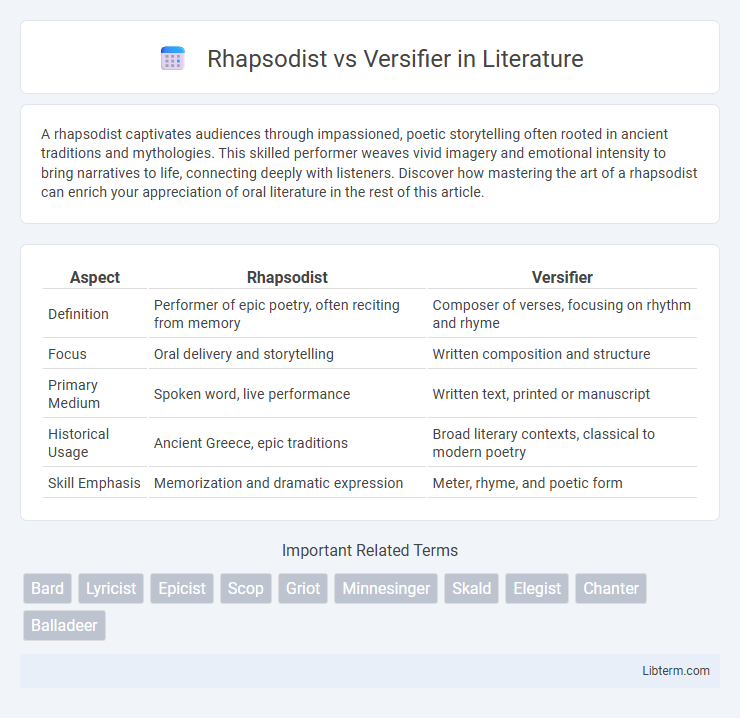A rhapsodist captivates audiences through impassioned, poetic storytelling often rooted in ancient traditions and mythologies. This skilled performer weaves vivid imagery and emotional intensity to bring narratives to life, connecting deeply with listeners. Discover how mastering the art of a rhapsodist can enrich your appreciation of oral literature in the rest of this article.
Table of Comparison
| Aspect | Rhapsodist | Versifier |
|---|---|---|
| Definition | Performer of epic poetry, often reciting from memory | Composer of verses, focusing on rhythm and rhyme |
| Focus | Oral delivery and storytelling | Written composition and structure |
| Primary Medium | Spoken word, live performance | Written text, printed or manuscript |
| Historical Usage | Ancient Greece, epic traditions | Broad literary contexts, classical to modern poetry |
| Skill Emphasis | Memorization and dramatic expression | Meter, rhyme, and poetic form |
Defining Rhapsodist and Versifier
A rhapsodist is a performer who recites epic poetry with emotional intensity and expressive delivery, often interpreting traditional narratives through oral storytelling. A versifier is a writer skilled in composing verse, focusing on the technical construction of rhyme, meter, and structure rather than performance. The distinction lies in the rhapsodist's role as an oral interpreter of poetry versus the versifier's role as a creator of written poetic form.
Historical Origins of Rhapsodists and Versifiers
Rhapsodists originated in ancient Greece as professional performers who recited epic poetry, notably the works of Homer, preserving oral traditions through expressive public storytelling. Versifiers emerged later in medieval Europe, primarily focusing on composing structured poetry with formal meter and rhyme, reflecting evolving literary conventions. The historical origins of rhapsodists emphasize oral performance and communal memory, while versifiers highlight written composition and artistic innovation.
Core Characteristics of a Rhapsodist
A rhapsodist is distinguished by their ability to passionately recite epic poetry, often improvising with emotional intensity and dramatic expression, whereas a versifier typically composes structured, metered verse with an emphasis on rhyme and form. Core characteristics of a rhapsodist include mastery of oral storytelling, a deep connection to cultural or historical narratives, and the skill to evoke vivid imagery through spontaneous, rhythmic speech. This oral tradition prioritizes performance and emotional resonance over strict adherence to poetic rules.
Essential Traits of a Versifier
A versifier demonstrates mastery in crafting structured, rhythmic poetry with precise meter and rhyme schemes, often prioritizing form over deep emotional expression. Essential traits of a versifier include technical skill in maintaining consistent patterns and adherence to traditional poetic constraints. Unlike a rhapsodist who emphasizes spontaneous, passionate oral performance, the versifier focuses on meticulous composition and polished literary craftsmanship.
Artistic Intent: Inspiration vs. Technique
Rhapsodists channel raw inspiration to evoke emotional and spontaneous storytelling, emphasizing passion and imaginative expression. Versifiers prioritize technique, meticulously crafting meter, rhyme, and structure to achieve formal poetic precision. The artistic intent of rhapsodists is driven by instinct and emotional resonance, while versifiers focus on mastery of poetic form and disciplined creativity.
Literary Styles and Language
Rhapsodists employ a highly expressive and dramatic literary style characterized by vivid imagery and emotional intensity, often drawing on oral traditions and epic narratives. Versifiers typically focus on structured rhyme schemes and meter, emphasizing technical precision and formal language patterns to create rhythm and musicality. The language of rhapsodists tends to be more spontaneous and dynamic, whereas versifiers prioritize linguistic discipline and poetic conventions.
Cultural Impact and Legacy
Rhapsodists, known for their oral storytelling in ancient cultures, significantly shaped early literary traditions by preserving myths and historical narratives through performance, influencing cultural identity and collective memory. Versifiers, skilled in crafting structured poetry, contributed to the literary canon by refining language and form, impacting education and artistic expression across generations. The enduring legacy of both lies in their foundational roles: rhapsodists in oral heritage and versifiers in written literature, each fostering cultural transmission and artistic evolution.
Noteworthy Examples of Rhapsodists
Rhapsodists are celebrated for their impassioned oral recitations of epic poetry, with Homer often cited as the quintessential example whose works like the Iliad and Odyssey shaped Western literature. Unlike versifiers who mechanically compose verses, rhapsodists deliver performances imbued with emotional intensity and cultural significance, exemplified by ancient Greek bards such as Peisistratus and Phemius. This oral tradition highlights the rhapsodist's role in preserving and transmitting collective memory through storytelling rather than simply writing structured poetry.
Prominent Versifiers in Literature
Prominent versifiers in literature, such as Alexander Pope and William Blake, are known for their skillful use of meter, rhyme, and form to create structured and rhythmic poetry. These poets meticulously craft their verses with a focus on technical precision and lyrical quality, distinguishing them from rhapsodists who emphasize spontaneous and passionate recitation. Versifiers contribute significantly to literary tradition by refining poetic techniques and establishing enduring stylistic conventions.
Choosing Between Rhapsodist and Versifier: Which Fits Your Voice?
Choosing between a rhapsodist and a versifier depends on your creative voice and the style of expression you seek. A rhapsodist excels in spontaneous, passionate storytelling with vivid emotional intensity, often improvising lyrical narratives that captivate audiences. In contrast, a versifier emphasizes structured poetic forms and technical precision, making it ideal for those who prefer carefully crafted, meter-driven compositions.
Rhapsodist Infographic

 libterm.com
libterm.com